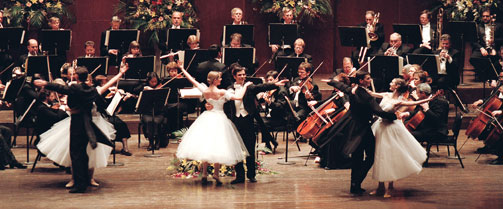Behind the Tradition of Salute to Vienna by Wah Keung Chan
/ December 1, 2011
Version française...
Flash version here.

It takes a lot of hard work and dedication
to organize 17 concerts in 16 cities, all happening within the span
of four days around New Year’s. For the last 18 years, Attila Glatz
Concert Productions has managed this feat through its highly successful
Salute to Vienna concerts. The key to the success of Salute to
Vienna is offering top-quality singing and dancing to the light-hearted
music of 19th century Vienna (healthy helpings of the waltzes
of Johann Strauss and Von Suppé).
In each city, Glatz uses the best
local orchestra and brings in the conductor, two singers and dancers
from Europe. Auditioning and coordinating 120 soloists as well as multiple
orchestras and venues is a huge undertaking. “We believe in presenting
good singers, and we never repeat the same cast in the same market,”
boasted Glatz, the Hungarian-born Canadian, who, with his wife Marion,
has been the series’ driving force.
It all began in 1995 with a concert
in Toronto at the 1,000-seat Toronto Centre for the Arts. Both Marion
and Attila had experienced the Viennese New Year celebration in their
youth, and they wanted to bring that idea to Toronto. At that time,
Attila already had over 10 years of concert production experience, having
founded the Huntsville Festival of the Arts in 1993 and was on the board
of the North York Symphony. “We thought nobody would come on January
1 and that it would be a big financial risk to hold it in Roy Thomson
Hall, so we held the concert in North York, with the North York Symphony,”
said Glatz.
That first concert must have tapped
into a hidden demand, as it sold out almost immediately. “It was such
a big success that Charles Cutts, president of Roy Thomson Hall, suggested
we bring it to that bigger hall,” said Glatz. In its second year,
Salute to Vienna not only expanded to a second city, it moved permanently
to Roy Thomson Hall, selling out that venue every year.
The third year of Salute to Vienna
was expanded to five cities, including Vancouver and New York. “It
was so risky I had to borrow the venue deposit for Lincoln Center from
a friend—and thank god he gave it to me,” said Glatz. All five concerts
sold out. “We now thought we had something, that this was a tradition,”
Glatz explained. Encouraged, he then brought the idea to 15 cities in
the fourth year, reaching a high of 33 cities at one point.
A love of music, traced back to his
youth, is evident when one talks to Glatz. At age four, he started playing
the piano. “I just sat down and played a song, and then my parents
took me to a teacher,” explained Glatz. At four and a half, he became
a bit of a prodigy, giving concerts and studying piano and composition
at the Franz Liszt Academy in Budapest. In his teens, Glatz took a liking
to jazz. Through his music, he “was able to leave Hungary; because
of communism, we all wanted to leave.” Glatz joined a group that left
to play in West Germany for two years. Later, he signed a contract to
play in Canada and he immigrated. Glatz subsequently became the national
concert organist for the Hammond Organ Company and toured all over Canada.
Glatz was performing when he met
Marion. “I was playing piano in a ski resort in Switzerland, and she
was just on holiday there,” said Glatz. Born in Berlin to a Viennese
father and a Polish mother, Marion grew up with a passion for both business
(receiving a Master of Business diploma in Nuremburg) and the arts.
In Munich, Marion worked in the recording and publishing industry for
19 years. “She was a really big classical music fan and we went to
a lot of concerts,” said Glatz. “I started to like classical music
again and I felt I was going back to my roots.” In 1983, after going
back and forth between Canada and Munich, Marion joined Glatz permanently
in Toronto to start their concert production business.
According to Glatz, the New Year’s
concert has always been a tradition in Europe. “The concert in Vienna
is televised to 1.3 billion people all over the world,” said Glatz.
Aside from Japan, where visiting Viennese orchestras have developed
a following, that tradition was non-existent outside of Europe. The
Glatz’s saw an opportunity, but rejected franchising out the idea.
So far, he has had a monopoly on North America, establishing Salute
to Vienna in all the major markets, such as Los Angeles, New York, Chicago,
Washington, Philadelphia, Florida and San Diego. “It’s all over
Canada, from Montreal to Vancouver; last year, we added Quebec City,
which was sold out,” he confirmed. Although they don’t receive any
financial support from Vienna or the Austrian government, Glatz has
the endorsement of the city’s mayor, as well as the president and
chancellor of Austria. Glatz is now looking to expand to Australia,
South America and, possibly, Asia.
Although organizing Salute to Vienna
is already a yearlong undertaking, Glatz also promotes other concerts.
Five years ago, Glatz teamed up with Roy Thomson Hall for Bravissimo!,
an annual opera gala in Toronto modeled on the millennium opera gala
that took place in 2000. “When we moved it to New Year’s Eve two
years ago, it became really popular,” said Glatz. Last month, Glatz
presented Canadian composer Zane Zalis’s Holocaust oratorio i believe
to a sold-out Roy Thomson Hall, and he hopes to take it to other cities.
“Business is one thing and music is another. In my heart, I’m still
a musician.”
Salute to Vienna, Dec. 30
to Jan. 2. Vancouver, Calgary, Edmonton, Toronto, Montreal, Quebec City
www.salutetovienna.com
Version française... |
|


